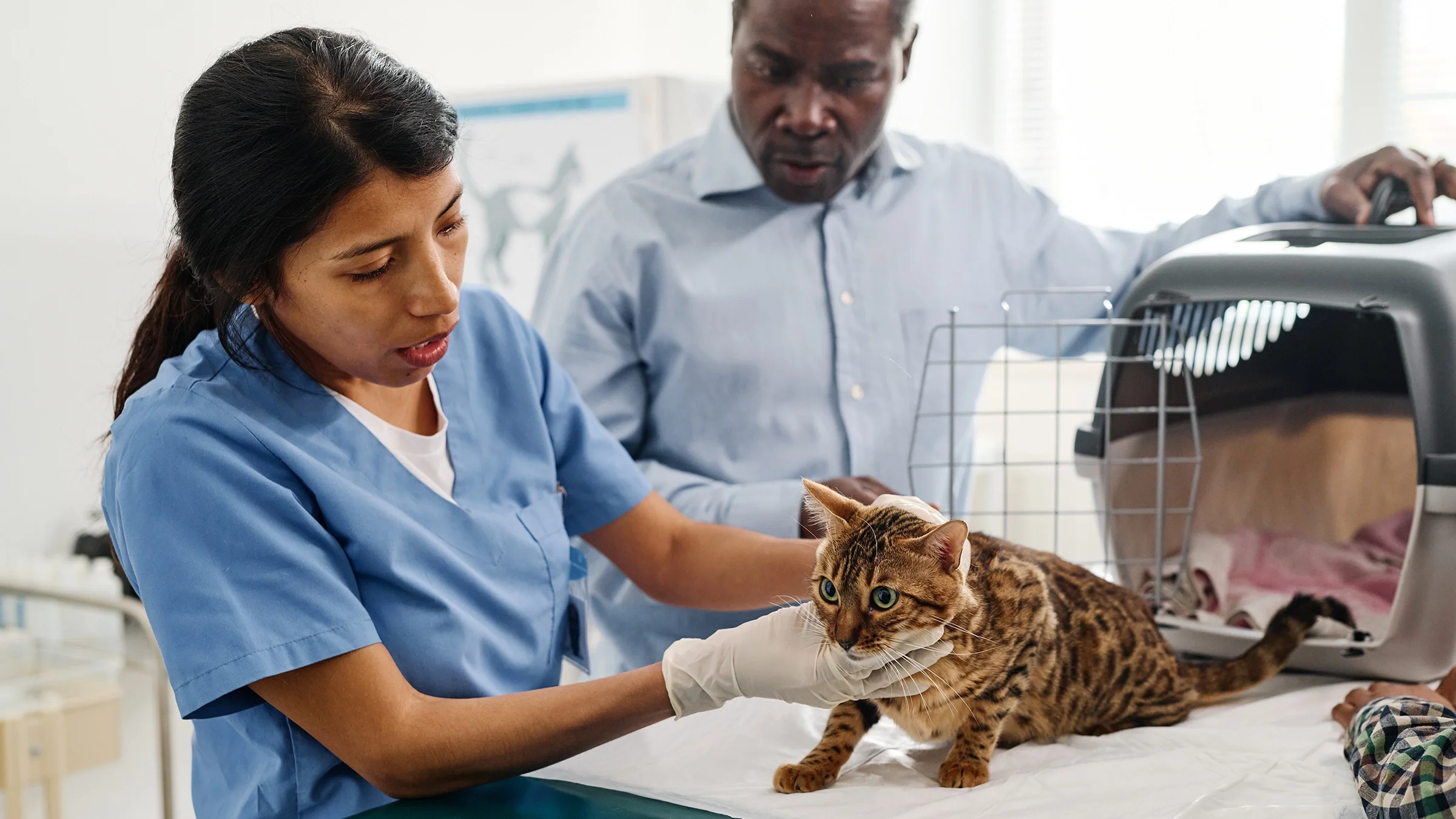Key takeaways:
Albon (sulfadimethoxine) is an antibiotic that can treat a variety of bacterial infections, as well as gastrointestinal coccidia infections.
Albon for cats is available as a flavored oral liquid that’s taken once a day. Cats typically take the medication for up to 5 days to clear an infection. And it’s generally well tolerated.
If your cat does experience side effects while taking Albon, they might include an upset stomach, vomiting, or diarrhea.
Save on related medications
Albon (sulfadimethoxine) is an antibiotic that effectively treats a wide range of bacterial infections in cats. If your veterinarian prescribed your cat Albon, you probably have questions. And the good news is: We have answers.
Keep reading to learn more about Albon for cats and what to expect when giving it to your furry feline.
Albon for cats at a glance
Common names | Albon (sulfadimethoxine) |
What it treats | Bacterial infections, coccidia |
How it comes (forms) | Oral liquid suspension, tablets, injectable liquid |
Common side effects | Loss of appetite, vomiting, diarrhea or soft stool |
Cost | About $25 for a full course of treatment |
What is Albon for cats, and how does it work?
Albon (sulfadimethoxine) is a sulfonamide antibiotic. It treats bacterial infections by blocking the growth of bacteria, allowing the immune system to eliminate infections.
Search and compare options
Albon effectively treats a wide range of bacterial infections in cats, including infections caused by the following bacteria:
Streptococcus
Staphylococcus
E. Coli
Salmonella
Klebsiella
Proteus
Shigella
These bacteria can cause the following types of infections:
Respiratory infections
Urinary infections
Uterine infections
Skin infections and abscesses
Gastrointestinal infections
In addition to treating these infections, Albon is effective against some protozoal organisms, such as coccidia. Coccidia often causes diarrhea and an upset stomach in young cats. Albon is prescribed off-label to cats to treat coccidia.
It is important to note that some bacterial organisms are resistant to Albon. So it should not be prescribed for all bacteria infections. In addition, Albon is not effective at treating viral or tick-borne bacterial infections in cats.
How is Albon given to cats and what is the typical dosage?
Albon is generally prescribed to cats as a custard-flavored 50 mg/mL oral suspension that most readily swallow. It is also available in 125 mg, 250 mg, and 500 mg tablets. Albon is generally prescribed as a once-daily treatment that’s taken for 3 to 5 days.
Read more like this
Explore these related articles, suggested for readers like you.
The initial dose of Albon for cats is 25 mg per pound of body weight. This works out to about 1 tsp of the liquid suspension for every 10 lbs of body weight.
Subsequent daily doses are 12.5 mg per pound of body weight — or ½ tsp of liquid suspension for every 10 lbs of body weight — for 3 to 4 days.
Albon can be given to cats with or without food, but it should be given at the same time each day. Albon does not need to be refrigerated. Just be sure to shake the liquid suspension well before use.
Ensure your cat drinks enough water while being treated with Albon. This will help prevent internal organ damage due to dehydration.
Your cat should show improvement within 2 to 3 days after starting treatment with Albon. But you should keep giving them the medication until they’ve been symptom-free for 48 hours. However, if your cat doesn’t show improvement after a few days of taking Albon, you may need to see your veterinarian again.
What are the common side effects of Albon in cats?
The most common side effects of Albon in cats include:
Stomach upset
Decreased appetite
Vomiting
Diarrhea or soft stool
If your cat experiences any of these side effects, try giving them the medication with a meal. If that doesn’t help, consult your veterinarian.
What are the most serious risks of Albon for cats?
Rare but more serious side effects are also possible with Albon. These include:
Dry eye associated with keratoconjunctivitis sicca
Bone marrow suppression
Skin rashes
Hives or swollen face (allergic reaction)
Urine crystals
If you notice your cat having any negative side effects, consult with your veterinarian as soon as possible.
Do not give Albon to a cat that is pregnant, breeding, or lactating or one who has liver or kidney disease.
Does Albon interact with any other cat medications?
Albon can interact with other medications that are used to treat cats. Use caution when combining any of these medications with Albon:
Cyclosporine
Corticosteroids
Glipizide
Insulin
Diuretics
Nonsteroidal anti-inflammatory drugs (NSAIDs)
Antacids
Be sure to tell your veterinarian about any medications or supplements you give your cat before they are prescribed Albon.
What should you do if your cat misses a dose of Albon?
If you forget to give your cat a dose of Albon, give them the medication as soon as you remember. Then, give them the medication at the regular time the next day. Never double up on Albon doses to make up for a missed one.
The bottom line
Albon (sulfadimethoxine) is generally considered safe for cats, and most tolerate the medication well. It is effective against many different types of bacterial infections. It is also effective against coccidia infections in cats.
Albon is given to cats once daily and has a low risk of side effects. If your cat does experience side effects, they may include loss of appetite, vomiting, or diarrhea. Albon should only be given to cats under the supervision of a licensed veterinarian.

Why trust our experts?



References
Andrews, A. (2022). Coccidiosis of cats and dogs. Merck Veterinary Manual.
Brooks, W. (2022). Sulfadimethoxine (Albon). Veterinary Partner.
Budde, J. A., et al. (2023). Sulfadimethoxine. Plumb's Veterinary Drug Handbook, 10th Edition.
Ovung, A., et al. (2021). Sulfonamide drugs: Structure, antibacterial property, toxicity, and biophysical interactions. Biophysical Reviews.
Roat, M. I. (2022). Keratoconjunctivitis sicca (dry eye; keratitis sicca). Merck Consumer Manual.
Zoetis Services LLC. (n.d.). Albon (sulfadimethoxine).


















